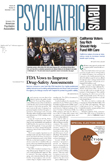Living and working in a college town, I have become accustomed to some of the seasonal events related to the students' arrival in late summer—calls from parents, friends, friends of friends, and colleagues who are trying to determine who should provide psychiatric care to their students/patients. Similarly, around November and December I get calls concerning students who did not seek care in the beginning of the fall semester, but are starting to experience psychiatric difficulties as academic pressures build.
College life for many students is a breeding ground for psychiatric problems, fed by alcohol and substance use, decreased sleep, stress, being away from family and perhaps far from familiar surroundings, absence of parental rules, changes in eating and living situations, peer pressure, classroom and study pressure, changes in exercise patterns and participation in organized sports, and so on.
We also often see students who have had major psychiatric problems—eating disorders, bipolar disorder, anxiety and mood disorders—and come to college hoping that somehow the change in environment and being away from home will help keep them well. We also know that the late teens and early 20s are ages when new psychiatric problems, such as schizophrenia, may develop.
Only recently has the subject of college students' mental health begun to get serious press. The article “The Dorms May Be Great, But How's the Counseling?” in the October 26 New York Times pointed out that one criterion in choosing a college should be access to mental health care. The proliferation of suicide on college campuses has also been in the news throughout the country. According to the Substance Abuse and Mental Health Services Administration, suicide is among the three leading causes of death of young people between the ages of 15 and 24.
The parents of one college student who committed suicide—Garrett Smith—took an important step that may prevent similar tragedies from occurring in other families. His father, Sen. Gordon Smith of Oregon, introduced the Garrett Lee Smith Memorial Act in Congress only a few months ago, and it was signed by President Bush last month (Psychiatric News, November 19). This legislation provides federal funding for suicide-prevention services, particularly those directed at youth.
Often mental health clinics on university campuses are set up to provide psychological and social work services rather than psychiatric care. Psychiatrists are sometimes available only on a limited basis, and the insurance benefits for mental health care that a family has at home may not translate into private, fee-for-service psychiatric care in the college town where their student is studying.
Why am I raising these issues? I believe there is an important role for APA to assume in helping facilitate the provision of high-quality mental health services and education on college campuses. Working with our colleagues in a multidisciplinary, broad-based coalition including the American Academy of Child and Adolescent Psychiatry, American Society of Addiction Medicine, American Academy of Addiction Psychiatry, AMA, American College Health Association, American College Counseling Association, National Mental Health Association, National Alliance for the Mentally Ill, and others, we can develop prevention programs and materials; identify a better and more systematized way to provide referrals, support, and appropriate care for students; and continue our work to decrease the stigma of mental illness.
At the University of Michigan, where I am on faculty, we have been holding yearly “Depression on College Campus” symposia, featuring such experts as Thomas Insel, M.D., director of the National Institute of Mental Health, and Nora Volkow, M.D., director of the National Institute on Drug Abuse, to highlight the importance of good mental health care for students. We also have a university-wide task force that is determining how to better provide such care to students and educate them about mental health issues, as well as provide information to families so that they can identify when their student may need professional intervention and help them obtain it.
For APA to provide a leadership role on this issue, we must determine the extent of the problem; identify the stakeholders in local, regional, and national efforts; identify or develop model programs and the resources necessary to implement them; identify the roadblocks to implementation (such as financial problems); and develop evaluation programs so that we can make our efforts more effective.
A good starting point is our district branches and state associations—they are well positioned to work with colleges and universities and help provide an important link in this very important, yet vulnerable period for students and their families.
In the next few weeks, I will be appointing APA members to a work group on college mental health. I very much welcome your suggestions and thoughts on this subject. Please e-mail me at
[email protected]. In a future column, I will summarize what I learn from you and outline a strategy for APA to follow on this crucial issue. ▪

